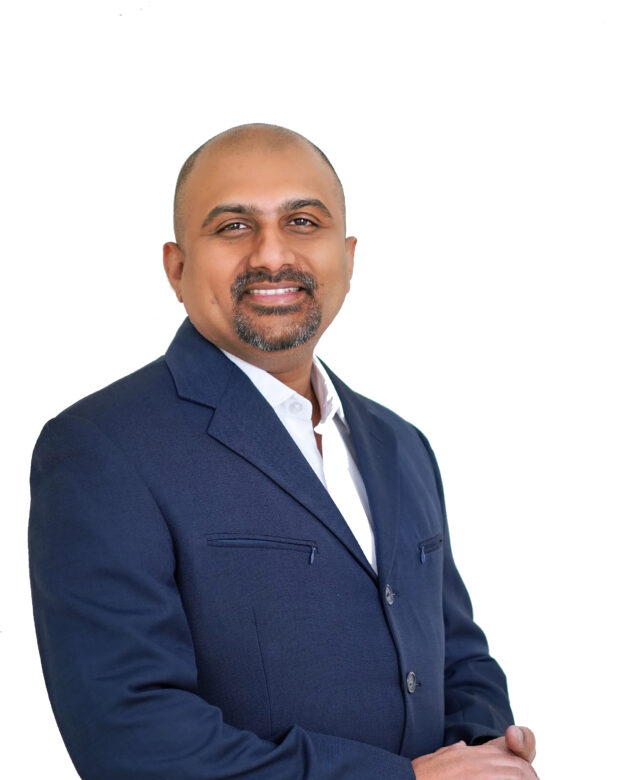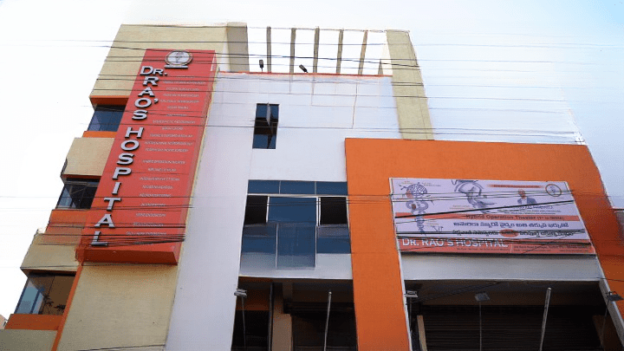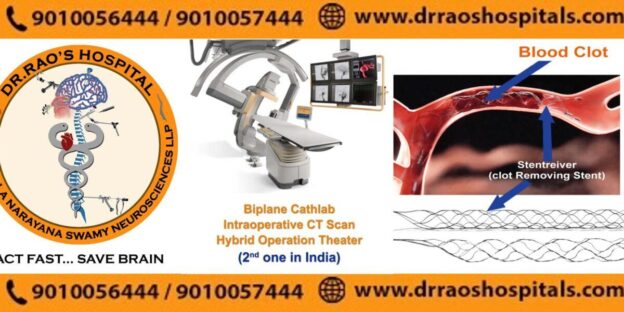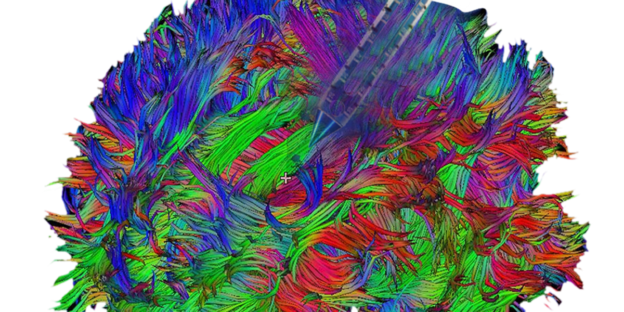Keyhole NeuroSurgery: Pain-Free Living
Imagine treating complex brain and spine problems through tiny incisions, minimal pain, and faster recovery. That’s the promise of keyhole neurosurgery—also called minimally invasive endoscopic or microsurgical approaches. At Dr. Rao’s Hospital, Guntur, Dr. Mohana Rao Patibandla performs keyhole brain and spine surgery using advanced optics, neuronavigation, and tubular retractors to help patients return to normal life sooner. If you’re searching for keyhole spine surgery near me in Guntur or looking for a keyhole neurosurgeon in Andhra Pradesh, you’re in the right place.
What Is Keyhole Neurosurgery?
Keyhole neurosurgery uses tiny, precisely planned openings—often 0.8–2.5 cm—to access deep brain or spine targets while preserving normal tissue. Surgeons use endoscopes or operating microscopes, plus neuronavigation (a GPS for the brain/spine) to reach lesions through the safest corridors. This philosophy applies across specialties: keyhole endoscopic brain surgery, keyhole microdiscectomy, keyhole TLIF (transforaminal lumbar interbody fusion), and keyhole foraminotomy.
Why “Keyhole” Works
- Less muscle and bone disruption → less pain and blood loss.
- Shorter hospital stay (often 24–48 hours).
- Faster recovery with earlier mobilization.
- Smaller scars with better cosmetic outcomes.
[Source: Mayo Clinic – Minimally Invasive Neurosurgery]
Conditions Treated with Keyhole Brain & Spine Surgery
Keyhole Brain Surgery
- Brain tumors (e.g., meningiomas, gliomas, metastases) – keyhole brain tumor surgery Guntur.
- Pituitary adenomas via keyhole pituitary surgery (endonasal endoscopic approach).
- Trigeminal neuralgia – microvascular decompression via a keyhole craniotomy.
- Aneurysms – select cases via keyhole craniotomy (keyhole surgery for aneurysm).
- Colloid cysts & intraventricular lesions via endoscopic corridors.
Keyhole Spine Surgery
- Herniated disc: keyhole microdiscectomy or keyhole endoscopic discectomy.
- Spinal stenosis: keyhole foraminotomy or decompression.
- Instability or spondylolisthesis: keyhole TLIF or keyhole lumbar fusion.
- Spinal tumors (selected cases) – keyhole surgery for spinal tumors Dr Rao.
At our dedicated Spine Surgery and Neurosurgery units, these procedures are performed with IONM (intraoperative neuromonitoring), high-definition endoscopy, and neuronavigation.
[Source: PubMed – Outcomes of Keyhole/Endoscopic Spine and Skull Base Surgery]
Who Is an Ideal Candidate?
Keyhole approaches suit many—but not all—patients. Suitability depends on tumor size/location, spinal alignment, bone quality, prior surgeries, and overall health. During consultation at Neurology Services or Neurosurgery Department, you’ll undergo clinical evaluation and imaging (MRI/CT). The goal is to choose the least invasive route that delivers the best outcome.
| Condition | Typical Keyhole Option | Potential Benefits |
|---|
| Herniated Lumbar Disc | Keyhole microdiscectomy / endoscopic discectomy | Same-day/overnight stay, rapid pain relief, tiny incision |
| Lumbar Canal Stenosis | Keyhole decompression/foraminotomy | Less muscle damage, early walking, lower blood loss |
| Spondylolisthesis | Keyhole TLIF / keyhole lumbar fusion | Stability restoration with muscle-sparing access |
| Pituitary Adenoma | Endoscopic endonasal keyhole pituitary surgery | No scalp incision, short stay, fast recovery |
| Trigeminal Neuralgia | Keyhole microvascular decompression | Durable pain relief via small retrosigmoid window |
[Background reading: NIH – Minimally Invasive Neurosurgical Techniques]
Keyhole Neurosurgery at Dr. Rao’s Hospital, Guntur
Dr. Mohana Rao Patibandla brings global expertise to Andhra Pradesh, offering:
- Keyhole spine surgery Guntur (endoscopic discectomy, foraminotomy, TLIF, lumbar fusion).
- Keyhole brain surgery (pituitary, skull base, trigeminal neuralgia, selected aneurysms, brain tumors).
- Neuronavigation & IONM for precision and safety.
- Enhanced Recovery After Surgery (ERAS) protocols for quicker rehabilitation.
Explore our official website and learn more about Dr. Mohana Rao, widely regarded as a top keyhole neurosurgeon in Guntur and a best keyhole spine surgeon in India for patient-centric, minimally invasive solutions.
Benefits Patients Love (Backed by Evidence)
- Less pain & faster mobility: Keeping muscles intact reduces postoperative pain and speeds walking.
- Shorter hospital stay: Many spine patients go home within 24–48 hours.
- Lower infection & blood loss risks compared with open procedures.
- Earlier return to work and daily activities—often within 2–6 weeks depending on the procedure.
[Global context: WHO – Surgical Safety]
Keyhole Spine: What to Expect Before, During & After
Before Surgery
- Clinical exam, MRI/CT, blood work.
- Medication review (blood thinners, diabetes control, etc.).
- Prehab: gentle walking, core activation, nutrition.
During Surgery
- Tiny incision; tubular retractor/endoscope; image guidance.
- Real-time nerve monitoring (IONM) for safety.
- Typical duration: 45–150 minutes depending on complexity.
After Surgery
- Mobilization within hours; light diet same day.
- Analgesics and early physiotherapy.
- Return to desk work: 1–3 weeks (microdiscectomy/foraminotomy), 3–6 weeks (fusion/TLIF) as advised.
See our Spine Surgery page for recovery tips and timelines tailored to keyhole surgery recovery time in Guntur.
Keyhole Brain Surgery: Common Patient Questions
Is keyhole brain surgery safe?
When performed by experienced teams using navigation and high-definition visualization, keyhole approaches are designed to reduce surgical risk by minimizing brain retraction and preserving normal tissue.
Which brain tumors qualify?
Many meningiomas, pituitary adenomas, metastases, and select gliomas can be addressed by keyhole routes. Your MRI determines the safest corridor—precisely the expertise at our Neurosurgery Department.
When can I go home?
Many keyhole brain procedures use short ICU observation with discharge in 1–3 days, depending on the case and recovery milestones.
Comparing Keyhole vs. Conventional Open Surgery
| Aspect | Keyhole Approach | Traditional Open Approach |
|---|
| Incision & Dissection | Tiny incision; muscle-sparing | Larger incision; more muscle dissection |
| Pain & Blood Loss | Less pain; minimal blood loss | More postoperative discomfort |
| Hospital Stay | Often 1–2 days | Frequently 3–5+ days |
| Return to Work | 2–6 weeks (procedure-dependent) | 6–12 weeks |
| Scar & Cosmesis | Small scar; better cosmetic result | Larger scar |
Procedures We Offer (Highlights)
1) Keyhole Microdiscectomy / Endoscopic Discectomy
Ideal for herniated disc with leg pain (sciatica). Patients often walk the same day and return home within 24 hours. Popular search terms include keyhole discectomy Guntur and keyhole surgery for herniated disc Guntur.
2) Keyhole Foraminotomy / Decompression for Stenosis
Targets narrow nerve channels causing neurogenic claudication or radiating pain. Keyhole access releases the compression with minimal muscle trauma—helpful for outcomes and recovery speed.
3) Keyhole TLIF / Keyhole Lumbar Fusion
Stabilizes painful spondylolisthesis or instability. Through a small corridor, disc is cleared, cage inserted, and screws placed percutaneously. Known locally as keyhole TLIF surgery Dr Patibandla and keyhole lumbar fusion Guntur.
4) Keyhole Endonasal Pituitary Surgery
Endoscopic route via nostrils—no scalp incision. Treats hormone-secreting tumors and vision-threatening macroadenomas with short stay and quick recovery.
5) Keyhole Retrosigmoid Craniotomy (Trigeminal Neuralgia/MVD)
Through a small behind-the-ear window, the offending vessel is separated from the trigeminal nerve—restoring pain-free living for many patients with classical TN.
Recovery Timeline & Rehabilitation
Recovery is individualized, but these general timelines apply to most patients at our keyhole spine and brain center in Guntur:
- Day 0–1: Walk with assistance, start oral diet, pain control.
- Week 1–2: Gentle walking; desk work often possible in microdiscectomy and foraminotomy.
- Week 3–6: Return to routine activities; light core rehab; fusion patients ramp up more gradually.
- 6–12 weeks: Resume sports/strenuous activity as advised.
Our physiotherapists craft a custom plan for posture, flexibility, and core strength—key to long-term success.
Cost, Access & Why Patients Choose Us
- Transparent care: We discuss keyhole neurosurgery cost ranges up front.
- Advanced tech: Endoscopes, microscopes, navigation, IONM.
- Experience: Hundreds of keyhole brain and spine procedures under Dr. Rao.
- Reviews: “Dr Rao keyhole neurosurgery reviews” mention quick recovery and compassionate care.
Ready to discuss your case? Contact Dr. Rao’s Hospital for an appointment or second opinion.
Safety, Evidence, and Global Best Practices
Safety comes from planning, precision, and protocols—not just small incisions. We follow international guidelines and continuously audit outcomes.
When Should You Consider Keyhole Surgery?
- Persistent leg/arm pain from a herniated disc or stenosis despite physio/medications.
- Trigeminal neuralgia refractory to medicines.
- Pituitary tumor with vision/hormonal issues.
- Brain tumor suitable for a keyhole corridor.
- Spinal instability requiring fusion with muscle-sparing access.
Book a consult with Dr. Mohana Rao Patibandla—advanced keyhole neurosurgery expertise in Guntur, Andhra Pradesh.
Patient Success Snapshot
(Illustrative) A 42-year-old with L4–L5 herniated disc underwent keyhole endoscopic discectomy. He walked the same day, discharged within 24 hours, and returned to desk work in 10 days. At 6 weeks, he resumed jogging after guided rehab. For more stories, visit our official website.
How to Prepare for Your Keyhole Procedure
- Bring prior MRIs/CTs and medication list.
- Stop smoking; control diabetes and blood pressure.
- Arrange 1–2 weeks of light duties post-op (procedure dependent).
- Set up your home for safe movement (handrails, clear pathways).
Call to Action
If you’re considering keyhole neurosurgery Guntur—for brain or spine—schedule a consultation at Dr. Rao’s Hospital. Speak directly with Dr. Mohana Rao Patibandla to explore the safest, least-invasive option for you. Call 📞 090100 56444 or write to 📧 info@drraoshospitals.com.
What are the symptoms of a condition that may need keyhole spine surgery?
Persistent leg pain (sciatica), numbness, weakness, or back pain from a herniated disc, spinal stenosis, or nerve compression—especially if physiotherapy and medicines haven’t helped.
How is a candidate for keyhole brain or spine surgery diagnosed?
Through a focused neurological exam and high-resolution MRI/CT. At Dr. Rao’s Hospital, we use neuronavigation planning to map the safest keyhole corridor.
Why choose Dr. Rao’s Hospital for keyhole neurosurgery?
At Dr. Rao’s Hospital, led by Dr. Mohana Rao Patibandla, one of the best neurosurgeons in Guntur, patients receive advanced, compassionate care using cutting-edge minimally invasive neurosurgery techniques.
Follow Dr. Rao’s Hospital
🌍 The Future of Keyhole Neurosurgery in India
As neurosurgical technology evolves, keyhole neurosurgery is redefining patient expectations for pain, precision, and recovery. India, especially Andhra Pradesh, is rapidly becoming a hub for advanced endoscopic and microscopic neurosurgical care.
Dr. Mohana Rao Patibandla has trained extensively in the United States, mastering skull base, endoscopic, and minimally invasive techniques. His work at Dr. Rao’s Hospital has made keyhole brain and spine surgery in Guntur accessible to patients across India and abroad—at a fraction of international costs, but with world-class standards.
Technologies That Empower Keyhole Surgery at Dr. Rao’s Hospital
- Neuronavigation Systems — 3D GPS mapping for precision.
- High-Definition Endoscopes — for magnified visualization.
- Intraoperative Neuromonitoring (IONM) — ensures nerve safety.
- Microscopic and Endoscopic Hybrid Techniques — tailored to each case.
- Advanced Pain Management Protocols — for quick, pain-free recovery.
These technologies allow complex surgeries—like keyhole brain tumor surgery, keyhole lumbar fusion, or keyhole surgery for trigeminal neuralgia—to be performed with unmatched accuracy and comfort.
🎯 Real Results: Transforming Lives with Keyhole Neurosurgery
Every week at Dr. Rao’s Hospital, patients regain independence after years of suffering from chronic pain, numbness, or neurological deficits. Many who feared surgery are now advocates of the keyhole approach.
“I walked just 5 hours after my keyhole spine surgery by Dr. Rao. My back pain vanished, and I was discharged the next day.” — Patient, Lumbar Discectomy (Guntur)
“After keyhole pituitary surgery, my vision improved within 48 hours. I’m grateful to Dr. Rao for his expertise and kindness.” — Patient, Pituitary Adenoma (Vijayawada)
Such experiences highlight how pain-free living is now a realistic goal through keyhole neurosurgery in Andhra Pradesh.
🧭 Comparing Keyhole Neurosurgery with Traditional Approaches
For many patients, understanding the difference helps relieve anxiety and build trust before surgery.
| Parameter | Keyhole / Minimally Invasive Approach | Traditional Open Approach |
|---|
| Incision Size | 1–2.5 cm | 6–10 cm or larger |
| Muscle Disruption | Minimal, muscle-sparing | Extensive dissection |
| Pain & Blood Loss | Less pain, minimal loss | Moderate to high |
| Hospital Stay | 24–48 hours | 3–7 days |
| Return to Normal Activities | 2–4 weeks | 6–10 weeks |
| Scar | Small and cosmetic | Large visible scar |
As seen, the keyhole approach offers superior recovery outcomes while maintaining surgical precision.
🏥 Why Patients from Across India Choose Dr. Rao’s Hospital
Dr. Rao’s Hospital isn’t just a local leader—it’s a regional referral center for complex brain and spine cases across Andhra Pradesh and South India.
- Trusted Expertise: Dr. Mohana Rao is among the few Indian neurosurgeons trained in all keyhole approaches—skull base, spinal, and neurovascular.
- Integrated Care: Neurosurgery, Neurology, Critical Care, and Physiotherapy under one roof.
- High Success Rates: Keyhole procedures at our hospital show 95–98% satisfaction in functional outcomes.
- Transparent Pricing: Affordable keyhole neurosurgery cost with world-class standards.
- Patient-Centric Values: Compassion, ethics, and excellence guide every case.
Our goal is simple: to help patients achieve pain-free living with the most advanced neurosurgical techniques available in India today.
💡 Keyhole Neurosurgery FAQs (Voice-Search Optimized)
What is keyhole neurosurgery?
Keyhole neurosurgery is a minimally invasive surgical approach that treats brain or spine disorders through small incisions using endoscopes and microscopes, reducing pain and speeding recovery.
Who is a candidate for keyhole spine surgery?
Patients with herniated discs, spinal stenosis, or nerve compression who haven’t improved with conservative therapy may benefit. Evaluation by a keyhole spine specialist in Guntur confirms suitability.
How long is recovery after keyhole surgery?
Most patients walk within hours and return to work in 2–4 weeks. Keyhole spine surgery recovery time depends on the condition and procedure type.
Is keyhole brain surgery safe?
Yes, it’s safe when performed by experienced neurosurgeons like Dr. Mohana Rao Patibandla. The smaller incision minimizes risk and improves recovery outcomes.
Why choose Dr. Rao’s Hospital for keyhole neurosurgery?
At Dr. Rao’s Hospital, patients benefit from advanced imaging, endoscopic technology, and multidisciplinary care led by Dr. Mohana Rao Patibandla—the best keyhole neurosurgeon in Guntur.
🌐 Global Standards, Local Expertise
Dr. Rao’s Hospital maintains international collaborations and continuously updates surgical protocols to match the standards of leading global institutions. The combination of cutting-edge equipment and human compassion ensures that every patient receives individualized, world-class care right here in Andhra Pradesh.
Whether it’s keyhole spine surgery for a slipped disc or keyhole craniotomy for brain tumors, our philosophy is the same: less pain, faster recovery, better life.
🧠 Key Takeaways
- Keyhole neurosurgery is the next frontier in safe, effective treatment for brain and spine disorders.
- Dr. Rao’s Hospital, Guntur offers the best outcomes using neuronavigation, IONM, and minimally invasive tools.
- From keyhole TLIF to keyhole pituitary surgery, these techniques deliver faster recovery and reduced complications.
- Dr. Mohana Rao Patibandla is a pioneer in keyhole neurosurgery in Andhra Pradesh and India.
- Patients can achieve pain-free living through advanced, compassionate care at Dr. Rao’s Hospital.
💬 Call-to-Action
If you’re struggling with chronic back pain, herniated disc, or a brain condition requiring surgical care, explore keyhole neurosurgery in Guntur at Dr. Rao’s Hospital. Consult Dr. Mohana Rao Patibandla, one of India’s leading keyhole neurosurgeons, for a precise diagnosis and minimally invasive treatment plan tailored to your condition.
📞 Call: 090100 56444
📧 Email: info@drraoshospitals.com
🌐 Visit: https://drraoshospitals.com
Follow Dr. Rao’s Hospital




